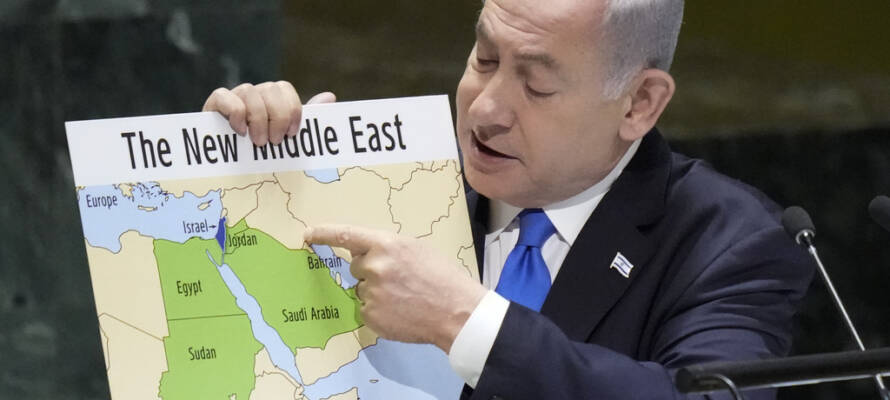At the U.N., the prime minister described an extraordinary vision of peace for the region and the world.
By Fiamma Nirenstein, JNS
Israeli Prime Minister Benjamin Netanyahu is back, whether he arouses admiration or anger, love or hate in his audience.
Last week, the prime minister made it clear that now is the time for Netanyahu’s Peace.
From the podium of the United Nations, Netanyahu announced to the world a new path, born of a peace forged by the United States, Saudi Arabia and Israel.
This path has long been the subject secret meetings. Then it went public in Netanyahu’s meeting with U.S. President Joe Biden. Finally, Saudi Crown Prince Mohammed bin Salman (MBS) told the global media that “every day” a peace agreement draws closer.
In 2012, Netanyahu spoke to the U.N. carrying a drawing of a bomb and a red marker. He used the latter to mark the red line beyond which Iran would enrich enough uranium to construct a nuclear weapon. He warned that Israel would never allow this to happen and told the world not to let it happen.
This time, Netanyahu spoke again of Iran, speaking in defense of the desperate Iranian people whose human rights are daily violated by the mullahs’ criminal regime. He cited the nuclear threat, as he should have. But he used the marker to demonstrate another aim: peace.
He drew a line of hope through the entire Middle East, from Asia to Africa and up to Europe through the Mediterranean Sea. It was a geopolitical design with Israel at its center. It expressed a dream of stability, well-being and friendship; a vision of three continents linked by economics and innovation, finally able to defeat the dark axis that has united to attack democracy and humanity.
For Netanyahu, this is more than a dream: It is a practical strategy. Desperate for a place in history, Biden appears to have embraced it.
Yes, Netanyahu must extricate himself from his domestic problems. He is faced with an opposition that wants to destroy him politically and will attempt to do so at any cost, even if that cost is a revolutionary change in Israel’s place in the region and the world.
The left has already begun to criticize the emerging peace agreement with the Saudis, especially the possible agreement to a Saudi civilian nuclear program. But this is irrelevant. If MBS wants a nuclear program, he doesn’t have to do it through an agreement with Israel and U.S. He can always go to Russia and China. It’s better to do it through peace rather than conflict.
Yes, the Palestinian issue is still a problem, but the emerging deal indicates that the Palestinians’ veto on the peace process is dead. Nonetheless, Netanyahu maintained a moderate tone on the issue while still emphasizing Palestinian Authority chief Mahmoud Abbas’s incitement, antisemitism and use of aid funds to finance terrorism.
Despite all this, Netanyahu told the world that the Palestinians should be part of a peace process, although he eschewed the old cliches like “two states for two peoples.” He knows that the peace paradigm has been turned upside down: First peace with the Saudis, and then Palestinian willingness to reach a compromise.
But Netanyahu went further than regional agreements. He is positing the idea of a new world; a vision of democracy, artificial intelligence and even humanity’s future in space. To him, the sky is no longer the limit. If the goal is so great, one imagines that Netanyahu will pursue the peace with the Saudis together with the U.S. even if, in the extreme case, it means a new government must be formed or new elections held.
The revolt against judicial reform has brought masses of citizens into the streets for months, but Netanyahu has now turned the page. He has articulated a vision greater than that of his enemies: Peace and technological innovation for the entire world. These are the most pressing issues of our time, not domestic squabbles over the structure of the Israeli government.
Netanyahu has once again placed Israel at the center of the international arena. It will be difficult to undermine this accomplishment due to the provincial opposition of his domestic enemies.
The truth is that Israel is important once again. It was Netanyahu who made it important. Whoever tries to deny this in the name of anti-Bibi hate is nothing more than a defeatist.
Fiamma Nirenstein was a member of the Italian Parliament (2008-13), where she served as vice president of the Committee on Foreign Affairs in the Chamber of Deputies.
Do You Love Israel? Make a Donation to Show Your Support!
Donate to vital charities that protect Israelis and help inspire millions around the world to support Israel too!
Now more than ever, Israel needs your help to fight and win the war -- and also the battle of public opinion.
Anti-Israel bias and boycotts are out of control. Israel's enemies effectively use social media to incite brutal terror against innocent Israeli civilians. Please help us fight back!




